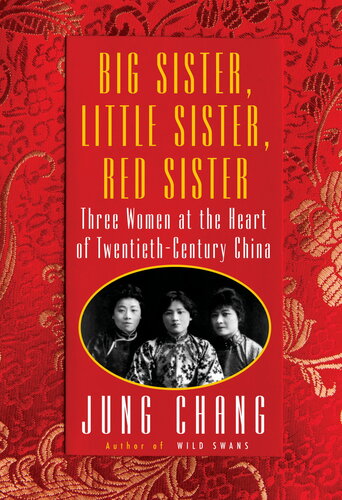
Big Sister, Little Sister, Red Sister
Three Women at the Heart of Twentieth-Century China
- اطلاعات
- نقد و بررسی
- دیدگاه کاربران
نقد و بررسی

May 1, 2019
Author of the internationally best-selling Wild Swans: Three Daughters of China, Chang tells the stories of the three influential daughters of the wealthy Soong family. Ai-ling was Sun Yat-sen's mistress before marrying Chiang Kai-shek's prime minister. Ching-ling became Sun's second wife and eventually an honorary president of Communist China. And May-ling became the wife of Chiang Kai-shek. With a 60,000-copy first printing.
Copyright 2019 Library Journal, LLC Used with permission.

September 16, 2019
Chang (Wild Swans) seamlessly chronicles the lives and marriages of the Soong sisters in this captivating triple biography. Born to a prominent Shanghai family in the final years of the 19th century, the sisters rose to national prominence in 1915, when Ching-ling (“Red Sister”) married Sun Yat-sen, the founder of the Republic of China. Meanwhile, Ei-ling (“Big Sister”) went into business with her husband, future finance minister H.H. Kung, starting on a path that would make her one of China’s richest women. But it was May-ling (“Little Sister”) who made the most auspicious match by marrying Nationalist leader Chiang Kei-shek in 1927. According to Chang, May-ling, among other heroic deeds, helped to peacefully resolve the 1936 Xian Incident, when Chiang was detained by two of his generals, thereby saving her husband’s life and preventing a full-fledged civil war from breaking out on the eve of WWII. Political tensions would eventually tear the sisters apart, however, as Ching-ling broke with her family to become vice chairman of Communist China under Mao Zedong. Chang’s artful descriptions track the sisters as they amass riches and influence, outwit opponents, and help to mold modern China and Taiwan. This juicy tale will satisfy readers interested in politics, world affairs, and family dynamics.

September 15, 2019
Chang (Empress Dowager Cixi: The Concubine Who Launched Modern China, 2013, etc.) follows three renowned sisters across more than a century. The story of the Soong sisters, writes the author, is a kind of modern fairy tale. The Christian Shanghainese family into which they were born was prosperous but not especially influential, and the girls themselves "were not great beauties by traditional standards." Yet, self-confident and determined, each made her mark. Ei-ling, the oldest, born in 1889, became one of the richest women in the country; Ching-ling, born in 1893, married Sun Yat-sen, the founder of the republican movement in China, whose renown endures throughout the Chinese-speaking world; and May-ling, born in 1898, married Chiang Kai-shek, the leader of the Nationalist government of China. According to the fairy tale, one sister loved money, another power, and the third her country--though, depending on one's politics, the third attribute could belong to any of them. Chang recounts the lives of the sisters and their deeds, as when May-ling, in the face of an impending Communist invasion, flew from the mainland to Taiwan, "a huge boost for the Nationalists' morale"; after Chiang died in 1975, she lived in seclusion in New York, her life spanning across three centuries. Ching-ling embraced the Communist cause, though it was only on her deathbed that she joined the party, acclaimed as "Honorary President of the People's Republic of China." Of the three, Ei-ling's life is the least compelling, though she had her accomplishments, as well. Chang's story is worth attention on the strength of the three sisters' notable doings, though her writing is often flat--"Above all, she had found fulfillment as a mother"; "The Generalissimo came to appreciate what his wife did"; "A whole new world opened up to Little Sister." Of middling quality, but a story full of twists that follow the course of modern Chinese history.
COPYRIGHT(2019) Kirkus Reviews, ALL RIGHTS RESERVED.

November 1, 2019
Of the Soong sisters, it is said that one loved money, one loved power, and one loved China. Chang's (Empress Dowager Cixi, 2013) collective biography explores the lives of these powerful and fascinating women who were at the center of twentieth-century Chinese politics and history. The oldest, Ei-ling, married wealthy banker and politician Kung Hsiang-hsi; Ching-ling married Sun Yat-Sen, the Father of Modern China, and May-ling married Generalissimo Chiang Kai-Shek. Chang reveals how, instead of being defined by their marriages, the sisters were influential in their own right and how politics and revolution eventually tore the family apart. Readers knowledgeable about Chinese history may quibble with some of Chang's characterizations, such as her claim that the Manchu government allowed Westerners into Shanghai to develop it instead of areas being forced open by Westerners due to the Opium Wars and how she at times treats mere assertions as fact, as in her contention that horrific miscarriages and resulting infertility motivated Ching-ling and May-ling. Still, this stands as a highly readable and accessible introduction to three important women who deserve wider recognition.(Reprinted with permission of Booklist, copyright 2019, American Library Association.)




دیدگاه کاربران